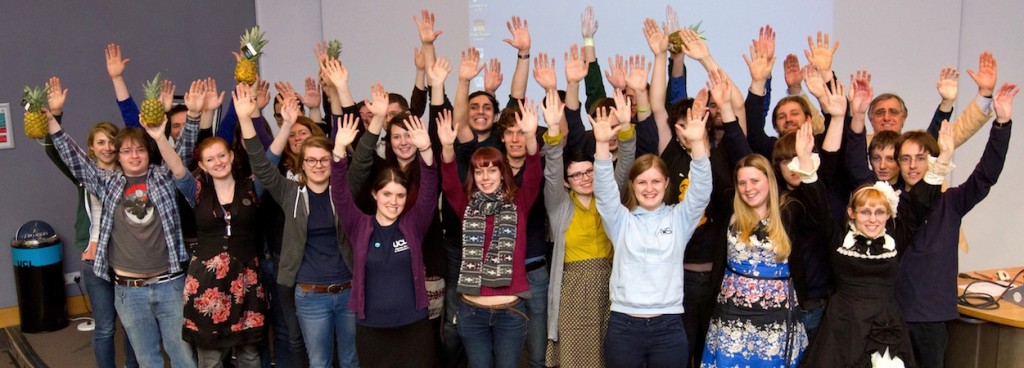By Hari Parekh
This article first appeared in the December 2015 edition of the IHEYO Youth Speak newsletter.
What is the need for Atheist, Humanist and Secular student societies at UK and Republic of Ireland (ROI) universities? The decline in religiosity in England and Wales was documented in the 2011 Census. This suggests an increasing need for institutions of higher education in the UK and ROI to provide an alternative point of view to those espoused by traditionalised religious societies, by creating a community for people to belong to. The National Federation of Atheist, Humanist and Secular Student Societies (AHS) are the optimum way of achieving this at UK and ROI universities.
The objective of the AHS, to have societies at every institute of higher education in the UK and ROI, is a sound objective to have, but what is the significance of this objective? The need to provide students with an alternative view at universities is paramount, as the purpose of having AHS societies on university campuses is to promote rationality, discussion and debate. This is essential to the university experience! An additional purpose is, for AHS societies to act as a network for people that are non-religious or agnostic: in particular apostates within the apostate-tripartite model. I argue this model consists of three factors: firstly – people that have left religion, secondly – people that are thinking of leaving their religion, and thirdly – having left their religion, are struggling as they do not have a community to support them. AHS societies provide people a community – which they feel they have lost, like-minded people, and a safe space to think and discuss ideas without the fear of upsetting familial relationships.
But, why should AHS societies be valued at universities? As an apostate from Hinduism at the University of Northampton, there wasn’t a society or a community from which, to find support during the transition of leaving religion. Feelings of loneliness, frustration and fear are among the plethora of emotions during this transition. Due to the lack of non-religious representation at the university, I established the Northampton AHS society in 2013. As President I endeavoured to form a community, to create a network, and a safe place for people to discuss, debate, and explore ideas. Contacting Rory Fenton, (the president of the AHS at the time), and being in conversation with Ruth Haydock too (secretary of the AHS at the time), provided support, which was essential to the development of the society in Northampton. Being invited to the National Convention in London and meeting like-minded people provided me with a community I aimed to replicate at the University of Northampton. Throughout the years, the society held events and discussions, affirming its position amongst and above pre-existing religious societies, inviting Graham Smith from Republic, Leo Igwe, London Black Atheists and being involved in a debate with Andrew Copson and Abdullah al Andalusi. Under me, with the support of my committee, the society flourished, despite difficulties in such an environment, which positively lead the students’ union to award the society and myself – society of the year and president of the year respectively in 2015, and this society is still standing today under its new name: A Humanist Society at the University of Northampton. The AHS, from my perspective was, and should be valued for providing such support to students; for providing an alternative view and a community at university, because without it students are left stranded and without support.
If there is such a need for AHS societies at universities, what does the AHS actively do? My current role as New Societies Officer for the AHS is predominantly to help and support people at institutes of higher education to establish AHS societies. I work closely with society presidents and their committees to support them through the initial administration of starting a student society: through the bureaucracy of starting a new society with their students’ unions, and subsequently throughout their journey of maintaining a successful society in their first, second and third years respectively. Currently, new societies have recently been formed at the University of Leicester, Cambridge, Loughborough and Queen’s University Belfast: this in itself, is a great thing! In addition, the relevance of AHS societies and the apostate-tripartite model is that such societies provide a safe communal space for people to hear alternative views – safe from stigma, safe from the fear of antagonising familial relationships and an opportunity to finally be free to question, understand and discuss views with like-minded people. As an apostate, such environments are rare for people transitioning to leave their faith, with the opportunity of cooperative events such as Inter-faith week as an ideal chance to reduce the fear that is induced with doubting religion, god and religious faith. This is one reason why AHS societies are a necessity at institutes of higher education.
The AHS needs to be more active in its approach. There needs to be an increase in cohesion, in working with religious societies to break down social stigma in relation to non-religious views, to present an alternative view, and become part of more universities and institutes of higher education in the UK and ROI. But how does the AHS do this? By facilitating its volunteers to do more in their roles, with officers not sticking rigidly within the confines of their remit, but rather going above and beyond it, with the aim to raise awareness of non-religious views in environments that may never have been exposed to them. This is why there is a need for AHS societies.
Hari Parekh is a British Humanist residing in Nottingham, United Kingdom, and is the New Societies Officer of the National Federation of Atheist, Humanist and Secular Students of the UK.
